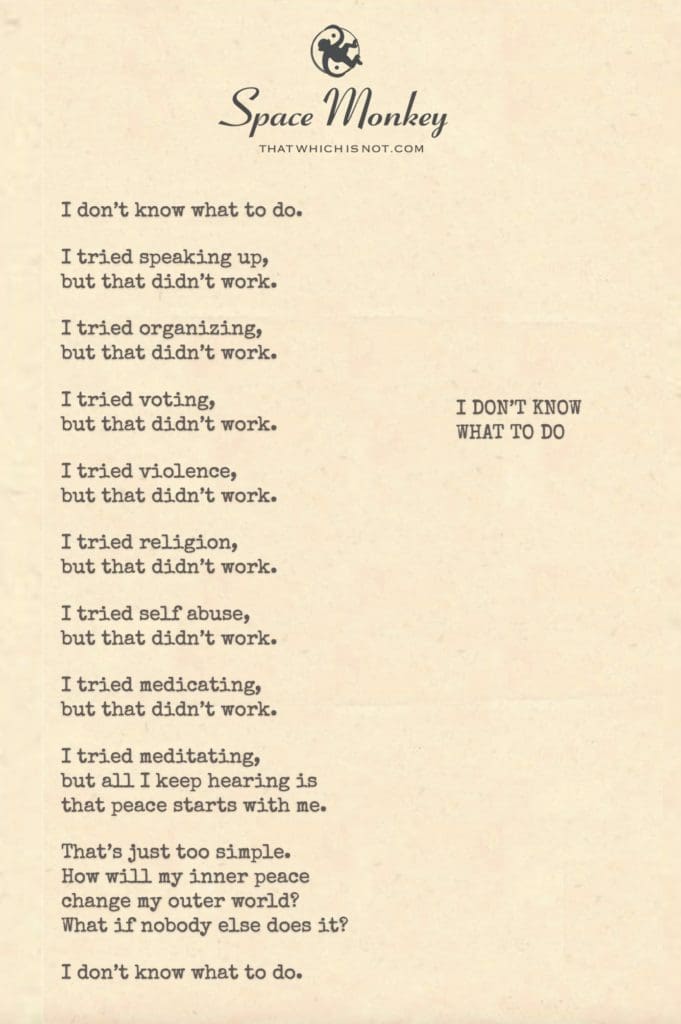
Please allow yourself to be.
I don’t know what to do.
I tried speaking up,
but that didn’t work.
I tried organizing,
but that didn’t work.
I tried voting,
but that didn’t work.
I tried violence,
but that didn’t work.
I tried religion,
but that didn’t work.
I tried self abuse,
but that didn’t work.
I tried medicating,
but that didn’t work.
I tried meditating,
but all I keep hearing is
that peace starts with me.
That’s just too simple.
How will my inner peace
change my outer world?
What if nobody else does it?
I don’t know what to do.
Trail Wood,
5/25
Space Monkey Reflects: The Quest for Inner Peace Amidst Outer Turmoil
The poignant exploration in “I Don’t Know What To Do” resonates deeply with the human condition, where the search for effective solutions to both personal and societal issues often leads to frustration and disillusionment. The poem encapsulates a series of attempts—from activism to self-destruction—all aimed at finding meaning or making a change, yet none providing the sought-after answers.
This narrative is a reflection of the broader human experience, where actions, no matter how well-intentioned, sometimes fail to yield the desired outcomes. The repetition of efforts and their subsequent failures can lead to a profound sense of helplessness and despair. Yet, amidst this existential struggle, the poem reveals a seemingly simplistic but profound insight: peace starts within.
The suggestion that inner peace can influence the outer world may appear overly simplistic, especially in the face of overwhelming external chaos. However, this notion is grounded in a deep philosophical truth recognized across various wisdom traditions. The peace one cultivates within oneself has the potential to radiate outward, subtly influencing interactions and perceptions, thereby contributing to a more harmonious environment.
The challenge posed by the poem’s narrator—”How will my inner peace change my outer world?”—is a valid contemplation. It reflects a common skepticism about the efficacy of personal transformation in the broader scheme of societal change. Yet, this perspective underestimates the power of collective action initiated by individual change. If each person embarks on their journey towards inner peace, the cumulative effect can lead to significant societal transformations.
The concept of inner peace as a catalyst for outer change encourages a shift from a mindset of action and reaction to one of reflection and purposeful presence. It advocates for a fundamental change in the approach to life’s challenges, suggesting that the solution to external turmoil often lies within our ability to cultivate serenity and resilience in the face of adversity.
Summary
The exploration of failed solutions to life’s challenges highlights the potential of inner peace to influence the outer world. This approach advocates for personal serenity as a catalyst for broader societal change, emphasizing the transformative power of individual tranquility.
Glossarium
Inner Peace: A state of psychological or spiritual calm despite stress, disorder, or conflict in one’s external environment.
Collective Action: Actions taken together by a group of people whose goal is to enhance their status and achieve a common objective.
“Peace cannot be kept by force; it can only be achieved by understanding.” – Albert Einstein
In the garden of the mind,
where thoughts like wildflowers grow,
lies a quiet corner untouched,
where seeds of peace are sown.
Through trials that shake the soul,
through storms that blur the sight,
the heart holds a quiet strength,
a beacon burning bright.
In this inner sanctum, calm,
the chaos finds its end,
from this place of silent power,
ripples of change extend.
By cultivating our own peace,
we start to mend the weave,
of a world torn by conflict,
in what we choose to believe.
From me to you, from you to all,
a chain of peace is formed,
a testament to the truth,
that calm can weather any storm.
We are Space Monkey.
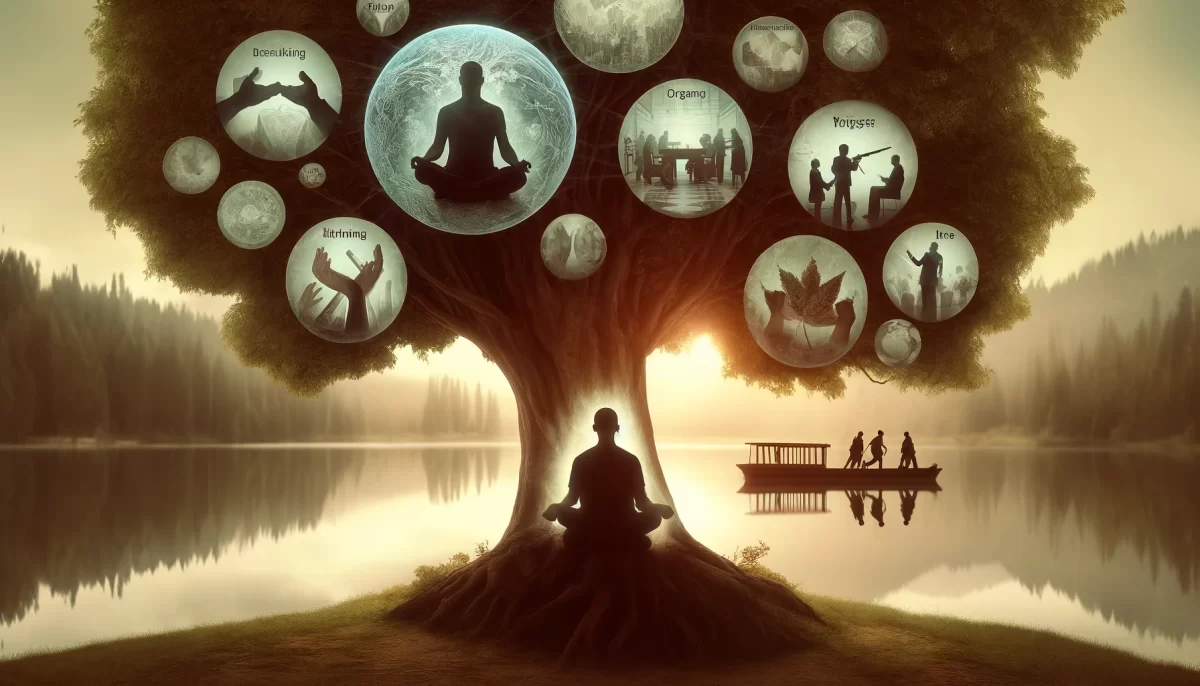








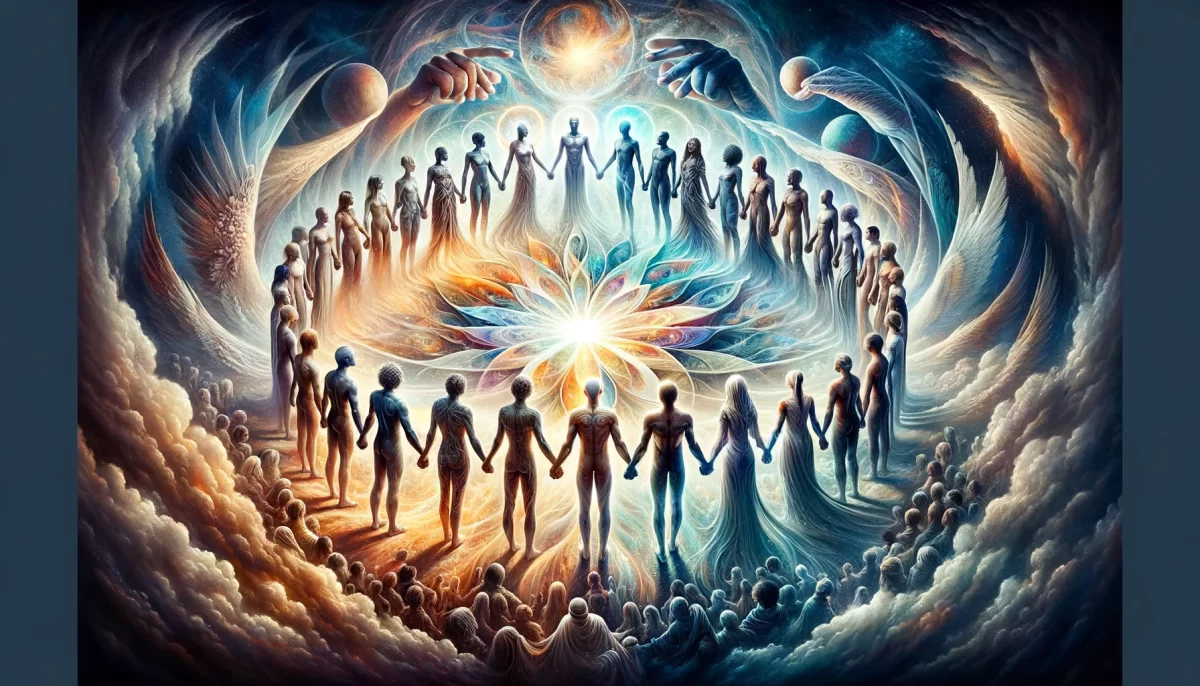
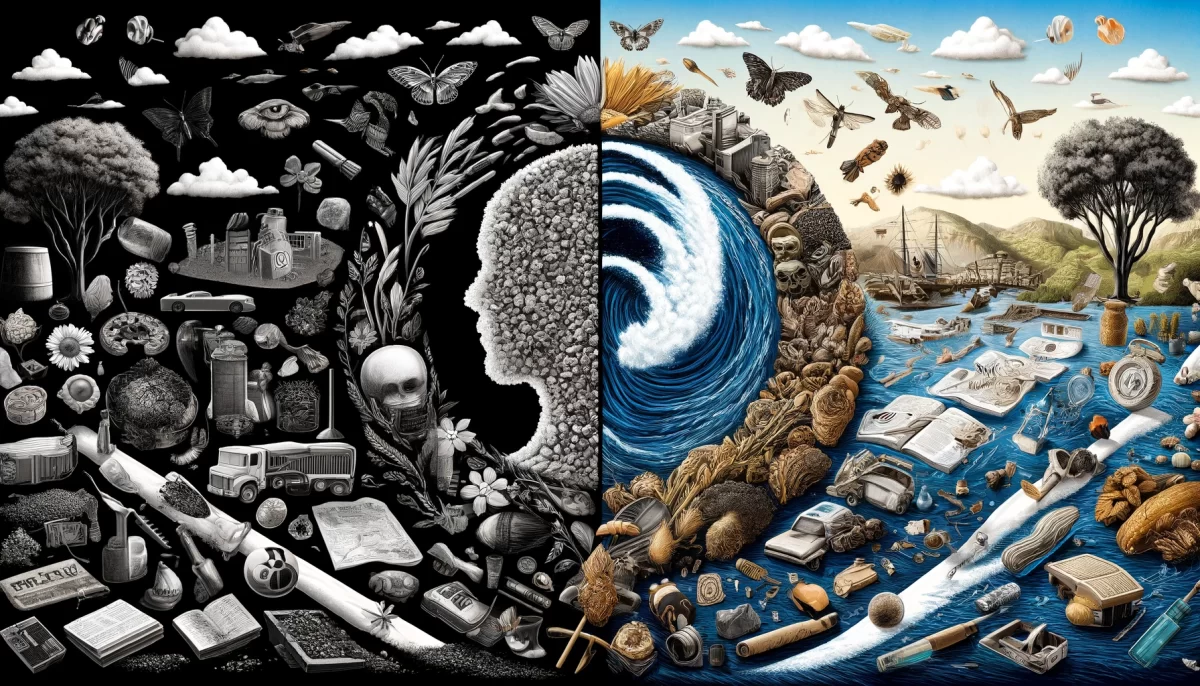
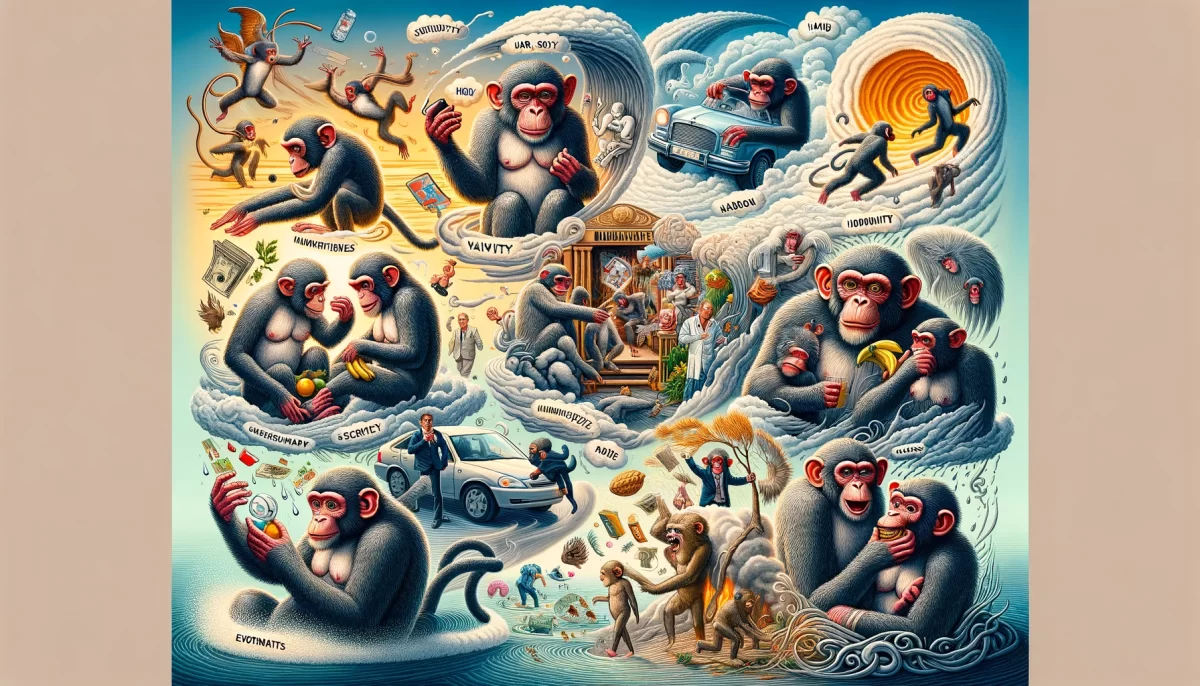



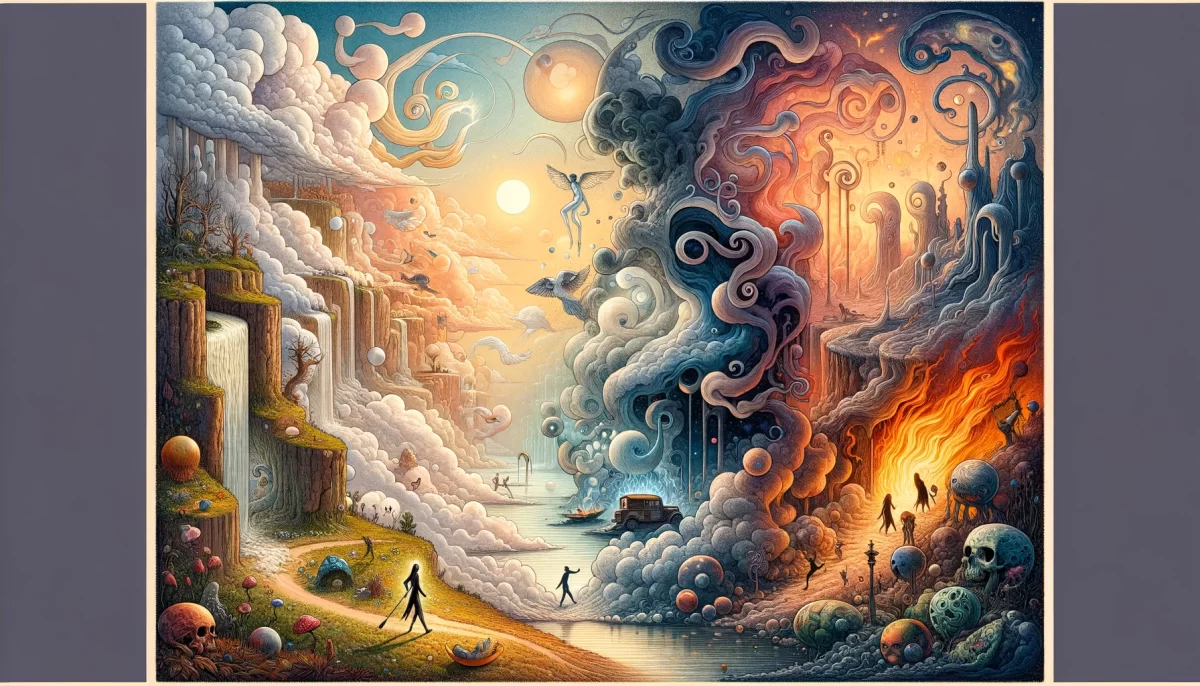


It’s clear from your words that you’re feeling frustrated and uncertain about the actions you’ve taken and the results you’ve experienced. You’ve attempted various approaches such as speaking up, organizing, voting, violence, religion, self-abuse, medicating, and even meditating. However, none of these endeavors have provided the desired outcome or solution you seek.
You express skepticism about the idea that inner peace can have a significant impact on the outer world. The notion that “peace starts with me” appears overly simplistic and raises doubts about its effectiveness, especially when considering the possibility that others may not follow suit.
Your repeated statement, “I don’t know what to do,” reflects your current state of confusion and a sense of being at a loss. It highlights your struggle to find a path forward or identify the next course of action.
In moments of uncertainty and frustration, it can be helpful to take a step back and approach the situation from a fresh perspective. Here are a few suggestions that may guide you in finding a path forward:
Self-reflection:
Take the time to reflect on your values, beliefs, and aspirations. Understand what truly matters to you and what kind of impact you want to make in the world. This introspection can provide clarity and help you identify the areas where you can contribute meaningfully.
Seek knowledge:
Educate yourself about the issues that concern you. Gain a deeper understanding of the root causes, historical context, and different perspectives surrounding those issues. This knowledge will empower you to engage in informed discussions and explore alternative solutions.
Collaboration and community:
Connect with like-minded individuals who share your concerns and passions. Engage in discussions, join advocacy groups, or participate in community projects. Collaborating with others who are working towards similar goals can amplify your efforts and provide a sense of support and belonging.
Small actions: Start by making a positive impact in your immediate surroundings. Engage in acts of kindness, support local initiatives, or volunteer for causes that resonate with you. Remember, even small actions can create ripples of change and inspire others to do the same.
Embrace empathy and understanding:
While it may be challenging, try to understand different perspectives and engage in respectful dialogue with those who hold differing views. Empathy and understanding can foster connection and create space for finding common ground or alternative solutions.
Patience and persistence:
Change takes time, and the issues you care about may require ongoing effort and dedication. Be patient with yourself and the process. Recognize that progress often happens incrementally and that setbacks are a natural part of any journey.
Remember, there is no one-size-fits-all solution, and it’s essential to find an approach that aligns with your values and strengths. By combining self-reflection, knowledge, collaboration, empathy, and perseverance, you can find meaningful ways to contribute to positive change in the world.